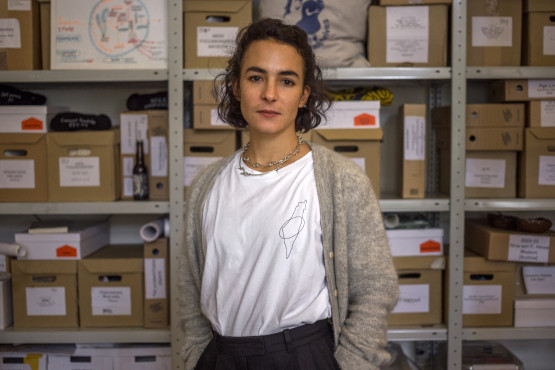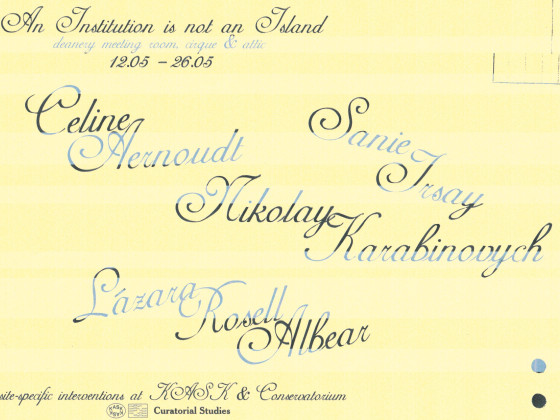
Curatorial Lectures: Aline Hernández
About
Each academic year, Curatorial Studies at KASK & Conservatorium School of Arts, S.M.A.K., and Ghent University co-organize the Curatorial Lectures series, inviting curators to share certain aspects of their practice. Following ‘Working with Artists’ (2017-18), ‘Learning from Artists’ (2018-19), ‘Working with Collections’ (2019-20), ‘Working with Space’ (2020-21), ‘Curating at the Nexus of Change’ (2021-22), and ‘The Curated Institution’ (2022-23) this year’s series ‘Working with Communities’ invites practitioners to discuss the role of curating in shaping communities and relationships. How can curatorial work reveal power dynamics and offer alternative social imaginaries?
Past speakers in the Curatorial Lectures series have included Cosmin Costinas, Cédric Fauq, Yolande Zola Zoli van der Heide, Simon Njami, Zoé Whitley, Ippolito Pestellini Laparelli, Karen Archey, Cecilia Alemani, Rebecca Lamarche-Vadel, Luca Lo Pinto, Joanna Mytkowska, Sofia Hernández Chong Cuy, Penelope Curtis, Mathieu Copeland, Anthony Huberman, Jean-Hubert Martin, Chus Martínez, Gabi Ngcobo, Marie Hélène Pereira, Susanne Pfeffer, Kasia Redzisz, Nicolaus Schafhausen and Adam Szymczyk.
Every academic year, S.M.A.K. Gent, Ghent University, and the Curatorial Studies program at KASK & Conservatorium School of Arts collaborate to organize the Curatorial Lectures series. This year's series centers on the theme 'Working with Communities' and features Aline Hernández as its third speaker.
Curators connect communities with cultural institutions. They engage with communities, ensure accessibility, address social issues, and build trust between different stakeholders. This year’s series ‘Working with Communities’ invites practitioners to discuss the role of curating in shaping communities and relationships. How can curatorial work reveal power dynamics and offer alternative social imaginaries?
Practical info
7 pm: Lecture
8 pm: Talk between Aline Hernández and CS students
Location: S.M.A.K. Gent, Auditorium
Free entry but reserve your place via curatorialstudies@hogent.be
Biography
Aline Hernández is a Mexican art historian, exhibition curator, and writer. Recently, she has been appointed Artistic Director of Casco Art Institute: Working for the Commons, Utrecht. The new artistic leadership, developed jointly with Executive Director Marianna Takou, remains committed to prefiguring post-capitalistic modes of living together through art-making, artistic exhibitions, and arts organizing while bringing a more clearly defined trans-disciplinary collective and collaborative curatorial practice based on anti/decolonial, feminist and queer approaches to commoning. Previously, she worked at the University Museum of Contemporary Art (MUAC) in Mexico, the European Biennial of Contemporary Art, and the Real Academia de España in Roma, among others.
Besides, Hernández is a lecturer at HKU University of the Arts, Utrecht, and guest lecturer at St Andrews University, Scotland where is also pursuing an SGSAH-funded PhD that engages with the spatial politics of (trans) feminicide violence in contemporary Mexico. She is a member of Arts Collaboratory, a trans-local ecosystem of 25 like-minded organizations situated in Asia, the Middle East, Africa, Latin America, and Europe focusing on art practices and processes of social change through radical imagination.
Casco Art Institute: Working for the Commons
Casco Art Institute: Working for the Commons is an experimental platform where art invites a social vision. Art and the commons are two key practices, which serve as tools and models for non-capitalistic ways of living together. Casco Art Institute works for this vision of art and the commons by creating a space or “Casco,” meaning, in Dutch, a basic structure for change, co-exploration, and study with collective art projects and organizational experiments. We co-develop collective art projects out of critical questions and radical imagination. Initiatives are process-based and place-specific, forming a community and generating art and knowledge as common resources. Organizational experiments take place within all these projects, including the organization of Casco Art Institute itself. We dream of offering an example of a commonly desirable institution of art and the commons that embodies diversity, equity, pluralism, and sustainability.
